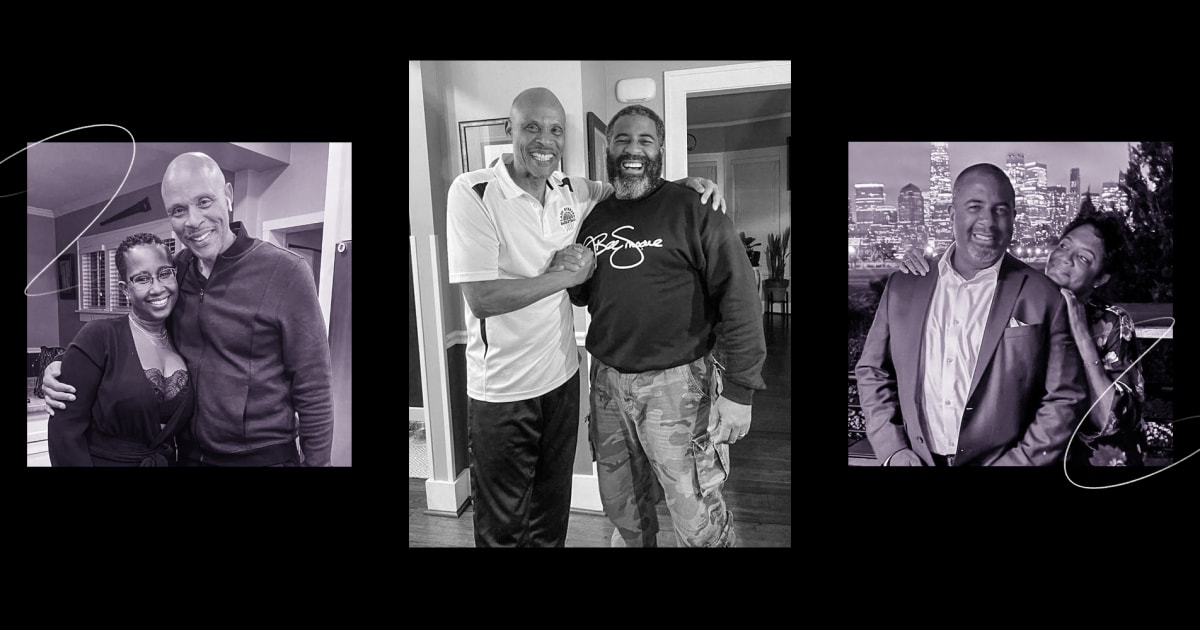
The college roommates had not seen each other in 21 years. But when Steven Robinson realized on a family trip to Detroit that he was within driving distance of Richard Koonce, he called his friend to ask if he could visit.
Koonce had introduced Robinson to his wife, Natalie, when they all attended Norfolk State University, a historically Black college in Virginia. When his old friend reached out he welcomed the couple and their three children to his home in Sandusky, Ohio, last summer.
“Felt great to see him after so long,” Robinson said.
But he was taken aback by Koonce’s considerable weight loss.
In a private moment, he asked: “Hey, man. What’s going on? You OK?”
Koonce was not OK. Since 2019 he had been battling a rare liver disease called primary sclerosing cholangitis, or PSC, a chronic disease that causes scarring within the bile ducts that can result in infections, tumors and severe liver failure, according to the American Liver Foundation.
He hadn’t planned on telling Robinson of his condition. But since he asked, he shared that he had tried various treatment options with little success, and that he was seeking a living donor for a transplant. The liver is the only organ in the body that can grow cells and regenerate itself, enabling a donor to give up a part of his liver to someone in need and the donor’s will grow back.
“Man, I’ve got to do something,” Koonce recalled Robinson saying.Robinson did not hesitate. In a gesture that stunned Koonce, he offered to donate a piece of his liver to, ultimately, save or extend his friend’s life.
Robinson spoke to his wife, Natalie, about it on the ride home to Teaneck, New Jersey, and she, without hesitation, supported the idea. They met with each their three children and discussed the scenario; all gave Dad the thumbs up to aid his friend.
Koonce had shared news of his condition with a small group of friends. “I couldn’t ask any of them to do this,” he said. “But ‘if it’s something you want to do, I can give you the information.’ That was my position.”
His wife, Marion, quickly stepped up to be the donor, as did his daughter, Morgan. But Robinson had the same O+ blood type and was a better physical match.
“It’s a special man who would volunteer to do something like this,” said Koonce, 62, a college prep director and head girls’ basketball coach for Sandusky Public Schools. “Steve is special.”
Robinson, 57, said he looks at it differently. “I think it was a spiritual thing,” he said. “I always had love for the brother. And I could see something was wrong. I could see it in his eyes. And he didn’t have the weight. So, it was a culmination of things. I had rejoined the church two years before the pandemic and found God, who led me through my spiritual battle. And I lost my father to the pandemic, which was tough.
“I also looked at it as something my children could look at it — not necessarily giving an organ — but being considerate of other people in life. There was a lot of prayer; I’m still praying on it. But I believe it’s the right thing to do.”
When the surgery is performed on Valentine’s Day at a Cleveland hospital, the two men will join a small number of Black patients in America who have undergone a living donor transplant. A U.S. Department of Health and Human Services Office of Minority Health report said that Blacks make up the largest group of minorities in need of organ transplants. In 2020, 83.6 percent of donor organs from Black people were from deceased donors. Only 16.4 percent were from living donors compared with 33.4 percent of white living donors.
“Living donors are very, very important; there are not enough organs to go around,” said Dr. Velma Scantlebury, the first Black woman doctor in the United States to perform transplant surgery, in 1989. “When you have someone who can donate to you, you’re not competing with the hundreds or thousands in your region also waiting for a deceased organ, which can take as long as five or seven years. You eliminate the risk of dying from an illness related to your liver while waiting on the list. But we have to raise education, especially in our communities because the number of organs cannot keep up with the need.”
Scantlebury said the Minority Organ and Tissue Transplant Education Program was working with community groups across the country to introduce more Black people to education around organ donation, “the need for preventive care, to understand the benefits of living donation because the list continues to grow, but not at the same rate at which organ donation occurs.”
The Robinsons learned of these imbalances during the multiple trips they made to Ohio for Steven to undergo a battery of tests. They also were educated on the process and recovery after surgery. Those visits reaffirmed their decision.
“I didn’t know that the liver could grow back, regenerate,” Natalie Robinson said. “So, for me, after learning that, there was no question. ‘You have to do this’ because if he didn’t and something happened to Richard, Steven would be devastated. To see this happen, especially with those two because they have such history, is special. Stephen is very happy that he can help. And so is our family.”
Doctors have not learned what causes PSC. It is not cancer and not similar to sclerosis of the liver, which can be caused by heavy alcohol consumption. Koonce, a “social drinker,” said he noticed discomfort in 2019 and was first misdiagnosed as having Crohn’s disease. His wife prepared vegan meals for him, and he said his “digestive system felt much better.” Eventually, though, he progressively lost his appetite and energy. Doctors placed stents in his bile duct, which ultimately caused complications and two hospitalizations.
Finally, the stents were removed and Koonce felt better, but he knew he had to find a donor, as the effects of the disease would augment. He could have quit coaching, but he signed up for one more year because he said he enjoys working with the girls under his tutelage and hopes they can learn something from his leadership, even as he now coaches mostly while sitting.
Robinson and Koonce said their lifelong bond that brought them to this moment is partly about the specialness of historically black colleges and universities in general, Norfolk State in particular.
“There’s something about the nurturing, the love you feel there,” said Robinson, who owns a graphic design company. “And that time living with Richard, 1990 and 1991, attending NSU, was when I grew up. It was special. It had to be. Look at us now.”
Koonce said he was sitting in church at a funeral when Robinson first called and then texted him that all the test results indicated he was a strong candidate, and that he was officially committed to being the donor. He showed his phone to his wife, Marion, to read the message.
“She cried,” Koonce said. “I hate what this has put her through. But she and my daughters have been steadying forces.”
After the operation on Monday, doctors have told Robinson he would be in recovery for six to eight weeks. For Koonce, it will take about six months.
Specialists caution that as with any surgery of this magnitude, complications could arise, especially on the receiver’s end. Still, “there is a very high success rate for this surgery,” Scantlebury, who has performed more than 2,000 transplants, said. “We usually tell people, ‘Your risk of dying is no greater than the standard in life.”
“We are leaving that to God,” Robinson said.
Koonce still marvels at his friend’s gesture and faith.
“I’m like, ‘Wow. This brother has love for me,’ When I think about it, it’s a hell of a thing to do,” he said. “But if the situation were reversed, I’d be like, ‘Is this what it takes for you to live longer? Man, let me check to see if I’m a good match.’ I really would. I would do the same thing for him.”
Source: | This article originally belongs to Nbcnews.com









